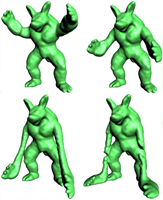
A Prediction-Correction Approach for Stable SPH Fluid Simulation from Liquid to Rigid
François Dagenais, Jonathan Gagnon, and Eric Paquette,Proceedings of Computer Graphics International 2012, Bournemouth, England, June 2012.
 |
A Prediction-Correction Approach for Stable SPH Fluid Simulation from Liquid to RigidFrançois Dagenais, Jonathan Gagnon, and Eric Paquette,Proceedings of Computer Graphics International 2012, Bournemouth, England, June 2012. |
The simulation of highly viscous fluids using an SPH (Smoothed Particle Hydrodynamics) approach is a tedious task. Since the equations are typically posed as stiff problems, simulating highly viscous fluids involves strong forces applied to the particles. With these strong forces, a very small time step is needed to keep the simulation stable and produce good results. The approach detailed in this paper uses an iterative prediction-correction scheme to optimize forces that act on the fluid, in order to produce a behaviour that varies from liquid to solid. This approach significantly reduces the computation times when the fluid is very viscous and almost rigid. At every time step, each particle position is predicted. The deformation is then compared with a target deformation and forces are adjusted to counteract the deformation. In addition to requiring lengthy computation times and tedious adjustment of time step to maintain a stable simulation, typical SPH simulators make it difficult to achieve the desired behavior. This difficulty is caused by the highly non-linear effect that the viscosity has on the behavior of the fluid. Compared to the typical viscosity parameter which varies from zero to infinity, the proposed rigidity parameter is easier to control, providing an intuitive variation from 0 (liquid) to 1 (solid). Since simulating high viscosity fluids is subject to large computation times and instabilities, we complement the proposed model with some important improvements. Firstly, an improved time step adjustment is proposed that results in both reduced computation times and increased stability. Secondly, an implicit temperature diffusion provides stable melting and solidification, regardless of the size of the time step. Thirdly, a constraint propagation provides faster convergence of the rigid forces to visually realistic behaviours. Together, these improvements and the proposed model allow the simulation of fluids with viscous behaviours that were very difficult, if not impossible, to simulate with current SPH approaches.
@InProceedings{Dagenais:2012:CGI,
author = "Fran{\c{c}}ois Dagenais and Jonathan Gagnon and Eric Paquette",
title = "A Prediction-Correction Approach for Stable SPH Fluid Simulation from Liquid to Rigid",
booktitle = "Proceedings of Computer Graphics International 2012",
year = "2012",
}
Adobe PDF version of the paper.
Slides from our presentation.
Video demonstrating the results:
